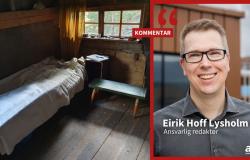Last week it became known that the Faculty of Social Sciences is heading towards a 40 million deficit in 2024. Several employees have subsequently criticized the management and are wondering how they could have “suddenly” gone into such a deficit.
In order to overcome the deficit, the management has now adopted a temporary freeze on posts at the faculty. This will affect several of the institutes very badly, says head of institute for comparative policy, Leiv Marsteintredet.
Cut positions
– We are hit hard by this. And it is certainly skewed as to who is hit the hardest, says the head of the department.
In 2024, among other things, the Institute for Comparative Politics, Economics, Geography and Sociology was to initiate several recruitment rounds. This has been temporarily put on hold.
– It is unfortunate when we have more people retiring.
Hardest hit will be the Department of Economics, where three of their positions will be frozen and not covered for employees who leave or retire.
The cuts go beyond the Ph. d. and postdoctoral positions that the institutes offer, because the new graduates have no permanent position to go to. This can lead to the new graduates applying elsewhere, and the SV faculty becoming an uncompetitive arena that loses very useful expertise from its fellows, according to the head of the department.
Marsteintredet points to the two hiring rounds that have been stopped at his own institute for the time being. An appointment round at the SV faculty takes place so that appointments go round at each faculty. He is surprised that other institutes are less affected by the hiring freeze than his own.
– It is also naive of vice-dean Siri Gloppen to claim that this deficit will not affect students. We may have to reduce the students’ freedom of choice by cutting the number of subjects if we have no one to teach them, and reduce enrollment on the course to maintain quality.
At the same time, he points out that the quickest solution is, of course, a complete halt to employment for a few years, but that this will far too much go beyond the teaching offer for the students. A better solution is to give the faculty some more time to sort out their own finances, so that the savings measures do not hit so hard.
– The deficit and the subsequent job cuts are something that directly affects the students, despite everything that is said.
Part of a bigger problem
According to a petition in Khrono, six professors write about a serious development in academia. Earlier last week, associate professor at the institute for comparative politics, Jan Oskar Engene, published a Facebook post in which he makes sharp criticism of the management. Here he points to the development the appeal addressed as one of the reasons for the ongoing “misery” at his own faculty.
– The appeal points to failing leadership and decay in academia, which I believe is also indicative of the SV faculty, says Engene to Studvest.
He supports claims that “strong academic traditions, values and norms of openness, integrity, quality and honesty are being undermined from within”. He also points to the petition’s example that “leaders hide and trivialize serious problems and prevent insight and discussion” as very relevant in this case.
– Employees do not dare to speak openly because of fear, not only for their own research career, but also because their own institute will be punished in the resource allocation if they openly criticize the management. The SV faculty is no exception here, argues Engene.
He refers to the faculty board meeting on 17 April where the deficit of millions came to light. He is very critical of the fact that the only documentation of the deficit was only on a PowerPoint. Engene wanted access to the presentation, which he believes he was refused. He believes this is a cover-up and a lack of transparency.
The PowerPoint was admittedly shared afterwards.
– However, the list of positions that have been postponed is nowhere to be found. I have asked for access, but have not been granted it so far. Together with incorrect information to the media, Dean Askildsen shows a large degree of lack of honesty.
Furthermore, Engene refers to his post during the faculty meeting and his request called “project gänreis trust”. According to him himself, the SV faculty needs a management they can trust, on which the future of the faculty is very dependent.
Pointing to the government
– The only thing we have decided is that we will withhold positions until the new year. Of course I understand that people react when positions that have been allocated are withheld, says Dean of the SV faculty, Jan Erik Askildsen to Studvest.
Askildsen points out that it has not been decided that anyone will be downsized or increased, but that many institutes will only stay at the norm of positions and employees they had the year before.
– Then there are some who are waiting for future departures, and then we have to solve those problems or deal with them eventually. But we are fully aware that there are various needs for new positions going forward.
On the question of the loss of fellows, and thus the loss of important research at the SV faculty, Askildsen points out that at UIB they do not train fellows directly for their own positions. They educate them for the whole of society, and believe that it is not a given that you get a job with them after completing your education.
He denies the claims from Engene that he does not share all information.
– We share all information that can be shared. It also takes a few days to respond to access requests. Rather, it is important to inform in the correct order, but nothing is secret and we hide nothing.
Askildsen was not aware of the petition that was published in Khrono, but he completely distanced himself from the accusations when he informed Studvest about them.
– We treat the institutes equally, and I perceive that we have a very open attitude and good discussions about all matters. But we are subject to a change in the funding system that affects us.
Dean Askildsen points to the funding change that will be introduced in 2025, where six funding categories will be converted to three. Askildsen talks about the general tightening that was done under former higher education and research minister Ola Borten Moe.
– It is the government that decides this. This is not something that is special to us. The fundamental problem here is that the university’s resources will decrease in the future. This happens for macro reasons such as the government’s decisions, and we cannot do anything about this.







